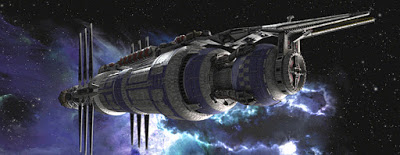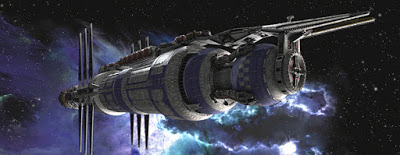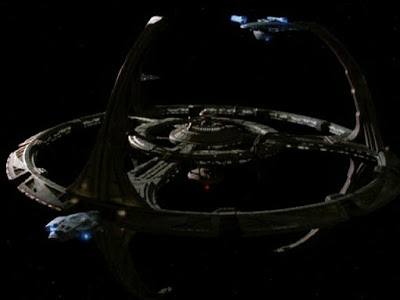I was in the process of talking to a group of sci-fi model builders about whether they had considered building models of the Raza from Dark Matters, or The Lifeboat from Timeless, when the conversation lead into older sci-fi shows. Of course Firefly came up as well as a few more obscure shows like Defiance and Falling Skies. It was at that point someone brought up how Defiance was a bit of a rip off of Alien Nation, but that’s not something I could comment on having never really watched either show. Then someone brought up an argument I hadn’t heard in years, being was DS9 a preemptive rip off Babylon 5 or was it vice versa?
Now, this was something I hadn’t heard or even thought about in years since both shows would emerge as totally different and distinct as they progressed through their various seasons. Back in the day though (and by that I mean 1993-94) DS9 and Babylon 5 fans had a long standing feud over whose space station themed sci-fi show was the real McCoy (no TOS pun intended), much like a sci-fi version of NYC’s Ray’s Pizza controversy. The first time I had heard about this controversy was from my brother, a Babylon 5 fan, who bought it up as well as the fact that he thought Babylon 5 was a better show and one that presented the future of mankind in a less rosy colored and more realistic view than what Star Trek gave us. The latter part of his argument is worth consideration, but the former part of his argument was up for debate.
The History of a Controversy
Star Trek: The Next Generation was, and in many ways still is a one of the most influential TV shows of all time. Its wake has not only left us with two spin offs and another free standing Star Trek franchise, but its legacy has given us everything from Firefly to the more recent Agents of Shield, and Dark Matters. In its time though it’s success and popularity launched many other sci-fi programs, some successful and long running, and others short lived and easily forgotten. TNG also managed to accomplish something else, it managed to prove that a show could be successful even if it was only in syndication and not on normal networks. It’s at this point a few things started happen in the world of TV, first the production of syndication only TV shows were on the rise, and second independent stations wanted to form a light network in order to have exclusive rights in their markets to some of these shows.
With both Paramount and Warner Brothers producing a lot of these syndicated TV shows, they were looking to capitalize on giving these smaller stations the light network they were looking for. At this point talks began between Warner Brother and Paramount about partnering on this network (now known as the CW), and hoped to further ride TNG’s success by bringing a premier space show to the table. Paramount with its longstanding relationship with Star Trek and it’s producers had a space station themed Star Trek show they wished to use, while Warner had access to a completely new sci-fi space station show concept they wanted to use, and in the initial talks to partners on the new network both shows would have been used. At some point though the talks began to go sideways, and the partnership deal fell through leaving both networks with sci-fi space station themed shows they wanted to produce, and with TNG both popular and close to ending it’s run Paramount’s Deep Space 9 concept was one commodity they didn’t want to miss out on. On the other end Warner was aware of Paramount s concept, and hoped to beat Paramount to TV with their Babylon 5 concept, and the race was on to see whose space station show would be first, and therefore considered the most original.
Both shows would air in 1993, but ironically neither show would air on a network started by either studio. A bigger irony is that Paramount’s Deep Space 9 would premier on Chicago’s local and national station WGN, which would later become a premier Warner Brother WB affiliate. To add to that irony in Chicago Babylon 5 would be shown locally on WPWR which would later become part of Paramount’s UPN network, and both shows would stay on their original stations till they ended.
At the Heart of It:
Ryan Britt with TOR.COM has an interesting take on it with his article; Is This the Smoking Gun that Proved Deep Space Nine Ripped Off Babylon 5 here he stated how in the process of creating a new network and partnership, Paramount and Warner openly shared with each other the concepts behind their respective space station shows, and how at one point Babylon 5 was almost just straight up adapted to the Star Trek universe leaving the old DS9 concept behind. Britt is careful to state however that although the basis of his information from an article on io9 is extremely interesting, it is still somewhat speculative.
At its core though we have two science fiction shows, both set on space stations, both mostly crewed by humans, in both cases the humans are part of an interstellar alliance (or federation) with many other aliens species, and both had the concept of a human commander who becomes a religious icon with an alien race. Lastly, both shows premiered in 1993, or in B5’s case its pilot movie did. As I understand it, B5’s pilot was put into production first and finished long before the pilot of DS9, however with the learner curves on a new sci-fi show B5’s post production dragged on later than expected, allowing DS9 to make it’s TV debut first with B5 showing up a few weeks later.
The Argument:
The fact that Paramount seemed to push DS9 to be finished and air-able on TV before Babylon 5 would make it appear as if both networks were fully aware of the others shows, and a race was on to beat each other to TV. This part of the argument that Paramount pushed to get DS9 out before B5, is pretty plausible. When resources are being gathered together and auditions made, it’s going to get around pretty quickly as to who’s making a space station show, and there just may have been some extra push by Paramount to get it on TV first.
The other argument is that the shows had more than a few similarities, and it’s obvious one took something from the other, more than likely DS9 from B5. I will admit from what I remember about B5 and what I do know about DS9 the similarities stretch beyond the fact that both take place on a space station. The religious icon commander, the pushy sneaky alien who’s up to no good, the alien who’s in tune with nature and religion, and the shadowy secret group of humans manipulating things behind the scenes,are are all character similarities we run across in each show. I could also point out the Defiance and the Whitestar as show similarities but both came in later seasons of their respective shows, as did the Dominion and The Shadows as antagonist. Outwardly, I suppose one could argue these similarities went beyond coincidence and it’s conceivable one show may have lifted from the other. At the same time though, and as I said I’m going from memory here, watching B5 I never got the feeling I was watching something that seemed overly familiar as you would expect in watching a show that has a carbon copy out there. Babylon 5 seemed to be it’s own unique show, with its own unique feel, or course being a sci-fi space show there were those cliche sci-fi meme’s, but not even our beloved Star Trek, or Star Wars didn’t escaped those.
With that said though in writing this I have had the chance to consult with many fans of one and/or both shows on their opinions and have actually had the chance to get some interesting details. As to whether or not they sway the copycat argument, I leave that up to you. The general consensus is that both shows are very similar in concept, but after that each show is genuinely unique. DS9 towed the Star Trek line keeping up with the franchise on Roddenberry’s concept of a better mankind, and how we come to deal with the galaxy. B5 on the other hand is darker, and a bit more adult (and I don’t mean in the bow-chikka-wow-wow sense) in the fact that the stories were a bit deeper, and a little darker, and grittier. But the interesting part is that in the process of writing B5 the story-lines and arc, were all carefully crafted before the series was made, and even a general multi-season arc was pretty well established. With that said and with some of what Mr. Britt mentioned in his article it seems plausible that DS9 in its first few seasons could have easily borrowed from B5, altering some of its general plot to the Star Trek universe.
So What Actually Happened?:
To be honest there are a lot of coincidences, but at the same time though there are many contrasts. One big thing that must be pointed out are the shows namesakes Deep Space Nine, and Babylon 5, two space stations with two separate identities. DS9 can be compared to a frontier fort that the British and French, or British and American Colonialists would have fought to control, since it guarded the mouth of a river, or some other strategic point. As to where Babylon 5 was constructed for the sole purpose of being an interstellar U.N. Building, or something very similar to Mass Effect’s “Citidel”. By their essence both space stations give each show a completely different feel, and plot direction, and change the motivations of their chief characters.
Could there have been “shared ideas” between both shows that made them similar at times? The answer is, Yes! Do I believe there were idea and plot stealing spies lurking within each show, No. When we boil it down we see that DS9 lived for 7 seasons, while B5 only went on for 5 and in that combined 12 seasons both series went completely different directions. DS9’s general direction was guided by its adherence to the Star Trek universe and its principals, as to where B5 was not bound by the rigidities of a pre-established universe and could move in whatever direction it’s writers felt compelled to take it. DS9 would end it’s seventh season helping to add to the Star Trek universe, and with plot points that would appear again in the Star Trek universe. B5 on the other hand would end as freely and retrospectively as it began.
To be honest I think we’ll have to chalk the real truth of the great Babylon 5 vs Deep Space Nine controversy, to being one last great mystery and debate among the fans of both shows for years to come.


